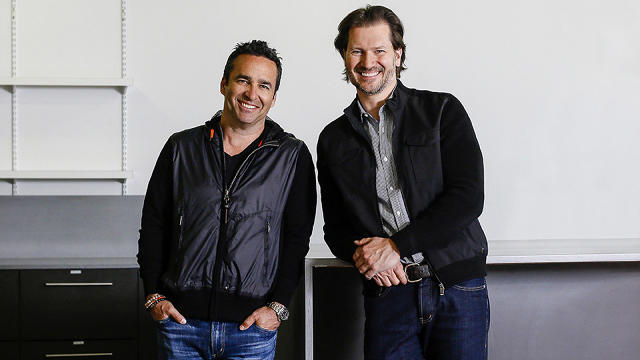Why Ashley Madison Thinks It Can Redeem Itself
Sometimes a company has an “oh no” moment that can cause it to fall by the wayside. How it responds speaks volumes about the organization’s potential longevity, as well as its leadership. For Avid Life Media, the company behind the infamous dating site Ashley Madison, that time is now.
After a huge public crisis that led to one of the biggest digital security breaches in history, the company is now trying to rise from the ashes. Last week it announced new leadership, this week it rebranded; “Avid Life Media” is now “ruby.” The question is: Is this enough to regain the trust of its users?
The Crisis
Ashley Madison, the storied dating site for people looking to cheat, has been in the spotlight for the last year when a hacking group claimed it had breached its system. The saga culminated in the attackers posting a database of every user on the website and the company spending months to figure out how best to regroup.
But changing a parent company name does not a new organization make. And when a website known for bucking social mores falls even further from public grace, it’s more than an uphill climb to become solid brand again. The two new executives at the helm believe they know what to do, and they explained the new “ruby” plan to me.

Last week the company announced that Rob Segal would be the company’s new CEO and James Millership would take the helm as president. Both men have worked with large companies and helped facilitate big turnarounds or rebrands. And, after talking with them about their plans for Ashley Madison and the like, it seems they both relish the challenge of repositioning an embattled company.
This project will be no easy feat. Indeed, the company has been in disarray for months, with users being outed and revelations that many accounts on the site were robots, or “fembots,” which were computer programs coded to chat with lonely men. A site like Ashley Madison is built on a strange form of digital anonymity and trust that was unceremoniously yanked last year.
The Plan
Last year the company decided to regroup, and probably the most important part of that equation was finding new leadership to steer the way. Both Segal and Millership were approached by ALM and spent months considering whether or not they would take the plunge. According to Millership, the two worked together performing due diligence to figure out if and how they could save the company. “We didn’t take the decision lightly,” he said. Ultimately the two figured there was an opportunity to be had and accepted the roles.
Following their appointments, this rebrand is the first important move the company makes to try and reclaim its territory. Now, “ruby” needs to reprove itself. Segal believes that what originally differentiated Ashley Madison from other sites could actually help rebuild the company. As he sees it, these sites have the “ability to operate at a level that most other dating sites can’t.” Sure, Ashley Madison was considered vulgar because of the kind of activity it facilitated, but he believes it looked at relationships in a markedly different way than every other dating platform out there. During our conversation Segal waxed philosophic about how human sexuality in 2016 is very different from even ten years ago. As Millership put it, he saw an opportunity to market to even more of Ashley Madison’s “adventurous clientele.”
What’s most interesting is that Avid Life Media is rebranding itself and not the infamous Ashley Madison name. This, says Segal, is because the site is a “huge brand.” The opportunity isn’t starting from scratch, but making something better from what is already there, he says. For one, the site will be “a lot more female-friendly.” Moreover, there will be a new emphasis on being both “tasteful” and “respectful.” The whole rebrand, says Segal, is to make now-ruby “a little more elegant.” The focus won’t be on cheating, per se, but on those excited moments that exist outside of monogamy and everyday monotony. Segal described that moment you first see someone that excites you; “you get butterflies,” he said. One ad in the company’s new campaign shows a woman in a boring job and tired relationship, and then seeing an attractive mystery man at a hotel counter. The new emphasis, from what I understand, is on facilitating that moment.
Also, the company says it is learning from past mistakes. It is take security more seriously than ever, say the two new leaders. They say the plan is to rebuild the technology and bring on new names to the roster. Ruby is “investing into new technologies,” says Millership, adding that it’s also looking for new brands and potential acquisitions. They are also trying to show how much they care about security and privacy—indeed, there’s a very prominent link on its home page to a section titled just that.
Is This Enough?
Rebrands are hard, and crisis public relations is even harder. The company remained silent for almost a year, ousted its CEO, and began trying to figure out a new path. It seems after months of boardroom discussions and leadership searches, it has crafted a new plan. The rebrand is part of it, along with a slew of new advertising like the one described perviously. The two executives also referred heavily to its global user base.
This is all in line with how companies believe they should respond in times of crisis. The Avid Life Media brand was significantly marred when news hit of the breach. It needed to craft a plan and create a congruous positive message post-crisis it could disseminate to the world. Most importantly, If the company is to survive, the one thing it would have to do is regain the trust of its users while maintaining the individuality that it had.
Crisis PR experts heavily refer to the strong “ties” and “relationships” organizations have with their customers. If that relationship is diminished, all bets are off. Companies have been able to do this in the past. For instance, 23andMe was in the spotlight three years ago for potentially giving erroneous information from the home DNA tests it offers. After months of bad press and fallout with the FDA, the company shifted slightly to still offer tests but focus more on the raw data provided, as well as ancestry information. The company is now back in good graces.
Of course a health-tech DNA testing company is a far cry from a website for people to cheat on their spouses. But Ashley Madison did have a fallout with its clientele and is trying to shift in a somewhat similar way. The rebrand and new focus on being “tasteful” is a way to offer a carrot to those who were scared off by the site before. Perhaps even those who don’t want to technically cheat; another ad shows a tired couple becoming excited about the addition of a possible third. Of course, the company isn’t swearing off the kind of services it offers. Instead, say Segal and Millership, ruby wants to show people that it wants to listen and be more amenable to what its customers want.

As Segal describes it to me, ruby’s new intent is to build dating sites “that people relate to.” The ads feature women prominently, and tell stories of people in known relationship quandaries (tired of their partner, bored, etc). Part of that is changing the inherent culture of the site, he says, and being more inclusive. Before, Ashley Madison was perceived as an outlet for disgruntled men to find affairs, now the hope is to include more people in the mix. “Ruby is reflective of where we want to take the company: feminine, multifaceted, sensual.” This refocus mixed with the new ads is a way the executives hope to bring in a more diverse user base. The company says it’s trying to make the ratio of men to women (and not men to robots) more even.
In short, Ashley Madison isn’t changing what it does, but is trying to show its customers that it cares about them by reframing its services, focusing on more global customers, and pledging to be more secure.
The next year will show us whether or not the rebrand works and customers once again trust the site. For Segal and Millership it’s about explaining to people that they listened to their concerns and changed they handle things. At the same time, they feel they have to “stay true to the edginess of the product itself.”
For Ashley Madison, it’s not a new name. Instead, says Segal, “we just feel that she can be repositioned.”
Fast Company , Read Full Story
(40)













